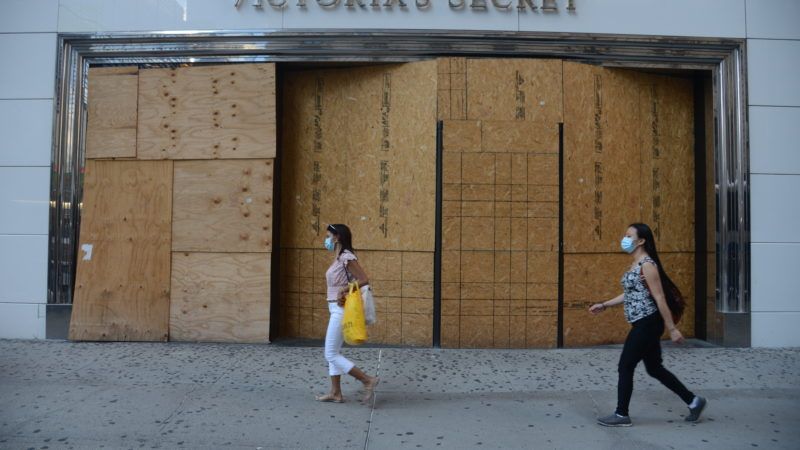The Fed Sees Lingering Economic Pain From the Pandemic and the Lockdowns
The danger of the virus can’t be considered to the exclusion of the need for jobs and prosperity.

The pandemic- and lockdown-slammed economy is starting to show signs of life—but don't get your hopes up too high just yet. Last week, Federal Reserve officials said the economy is recovering more slowly than anticipated and revealed their concerns that Americans have taken an unprecedented gut-punch from COVID-19 and from government reactions to it.
The dismal news came in the form of minutes from the Federal Reserve Open Market Committee's (FOMC) end-of-July meeting. And the minutes serve as a reminder that, as dangerous as the novel coronavirus is, public health measures have the potential to do at least as much harm as viruses.
Understandably, the battered condition of jobs and businesses was the overriding concern. Despite some signs of improvement, "economic activity still appeared to have declined at a historically rapid rate in the second quarter," the minutes revealed. "The projected rate of recovery in real GDP, and the pace of declines in the unemployment rate, over the second half of this year were expected to be somewhat less robust than in the previous forecast."
"Indicators of business fixed investment suggested that investment had generally not begun to recover but that the pace of declines had moderated, on balance, in recent months," they added.
The FOMC meeting came at the end of the second quarter, during which gross domestic product (GDP) dropped by an unprecedented 9.5 percent (an annual rate of 32.9 percent). July also saw COVID-19 cases spike in some states, and many government officials then re-imposed lockdowns that shuttered businesses and cut off paychecks.
"In June, we saw a significant increase in concerns related to reclosures due to rising levels of Coronavirus cases," reports Alignable, a small business network, of a survey of its members. In July, 5 percent of the 5,738 business owners polled said it was their "top concern."
Business owners have good reason to worry about lockdown orders, many of which arbitrarily distinguish between "essential" businesses allowed to function and "nonessential" businesses condemned to closure. At the end of July, Yelp, the crowd-sourced review company, noted that "even as total closures fall, permanent closures increase with 72,842 businesses permanently closed, out of the 132,580 total closed businesses." Permanent closures made up 55 percent of all businesses that closed since March 1.
Numbers like that have a devastating human cost.
"As many as a third of the 230,000 small businesses that populate neighborhood commercial corridors may never reopen," the Partnership for New York City reports of the carnage in that metropolis. Those closed businesses mean "as many as 520,000 jobs were lost from the small business sector."
The loss of jobs is a national phenomenon.
"Through June, only about one-third of the roughly 22 million loss in jobs that occurred over March and April had been offset by subsequent gains," say the FOMC minutes.
Since the July FOMC meeting, the national situation has changed somewhat. The July spike in U.S. COVID-19 cases has subsided, offering hope that people will regain confidence in moving about and engaging in some degree of normal activity. The decline in daily confirmed cases also may nudge government officials towards loosening restrictions so that people can exercise their own judgment about going about their lives, rather than depending on officials' whims.
But initial unemployment claims jumped back above one million last week. Before 2020, the previous peak in claims was 695,000 in October of 1982. That's an indicator that the economic hemorrhaging continues even if there are signs of life and we're (hopefully) past the worst of the pain.
Future spikes in COVID-19 cases—predicted in some quarters—could mean another drop in economic activity. That could result from personal choices by people fearful of infection, and because of draconian restrictions imposed by officials on those who might choose otherwise if left to their own devices.
"Participants observed that uncertainty surrounding the economic outlook remained very elevated, with the path of the economy highly dependent on the course of the virus and the public sector's response to it," the FOMC warns. "The ongoing public health crisis will weigh heavily on economic activity, employment, and inflation in the near term, and poses considerable risks to the economic outlook over the medium term."
To offset the damage to people's lives, the FOMC promises to use its own monetary policy tools—low interest rates, in other words—and assumes increased government spending. But it also warns that these policy tools are likely to be outweighed by the absence of actual economic activity and "the reactions of many states and localities in slowing or scaling back the reopening of their economies."
Basically, cheap money and government checks aren't a substitute for manufacturing, buying, selling, and employing. Nothing can stand in for productive human interactions.
None of this is to minimize the dangers posed by the pandemic. The virus has extracted a terrible toll in terms of deaths and suffering. People are justified in being wary of COVID-19, relative to their own vulnerability and their personal tolerances for risk.
But the pandemic can't be considered in isolation. It must be balanced against other human needs, such as social interaction, education, and the economic activity that produces the prosperity that makes it possible to fight against health threats. If governments forcibly shut down their societies, they may strangle the virus, but they're just as likely to kill off their own people—or, more likely, drive them to ignore the rules out of necessity.
We're in for a continuing measure of pain from the pandemic no matter what happens. But government officials have the ability to get out of the way of people trying to improve their conditions—or they can make the situation much worse.


Show Comments (71)